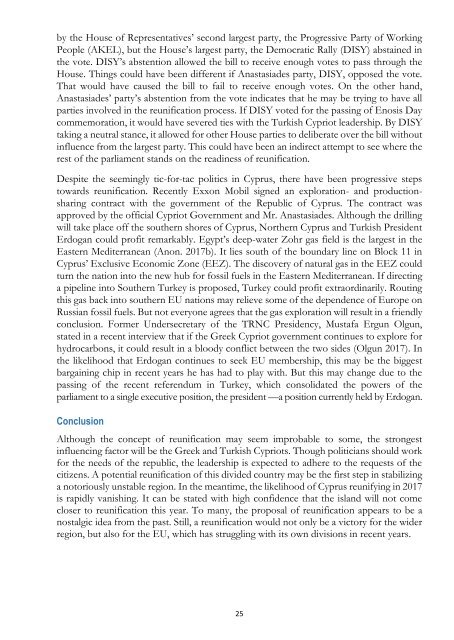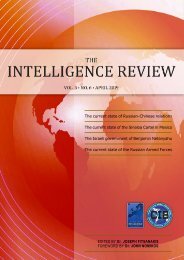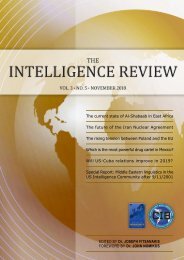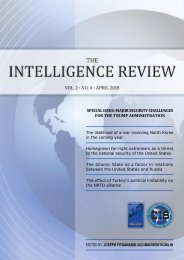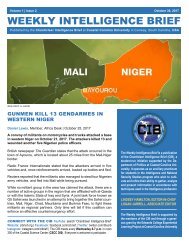The Intelligence Review | volume 2 | issue 3 |
This volume is the product of a collaboration between the European Intelligence Academy (EIA) and the Chanticleer Intelligence Brief (CIB), a student-run initiative supported by the Department of Politics at Coastal Carolina University in Conway, South Carolina, United States. Eight CIB analysts tackle some of the most pressing and timely questions confronting intelligence observers today. Topics in this volume include the current and projected strength of the Islamic State in Libya, the status of unification efforts on the island of Cyprus, the future of the government in Venezuela, and the United States’ place in the Paris climate agreement. There are also papers examining the construction of energy pipelines in Central Asia, as well as aspects of Iranian geopolitics in relation to the United States. Last, though certainly not least, we have included an estimative intelligence analysis of the first round of this year’s presidential elections in France. It refers to an event of global significance that has already taken place. However, it is included in this volume as an illustration of the power of intellectual accuracy and the ability of an intelligence analyst to achieve 100 percent accuracy —as this analyst does— by methodically considering and evaluating the analytical parameters of her question with the right balance of precision and intuition.
This volume is the product of a collaboration between the European Intelligence Academy (EIA) and the Chanticleer Intelligence Brief (CIB), a student-run initiative supported by the Department of Politics at Coastal Carolina University in Conway, South Carolina, United States. Eight CIB analysts tackle some of the most pressing and timely questions confronting intelligence observers today.
Topics in this volume include the current and projected strength of the Islamic State in Libya, the status of unification efforts on the island of Cyprus, the future of the government in Venezuela, and the United States’ place in the Paris climate agreement. There are also papers examining the construction of energy pipelines in Central Asia, as well as aspects of Iranian geopolitics in relation to the United States. Last, though certainly not least, we have included an estimative intelligence analysis of the first round of this year’s presidential elections in France. It refers to an event of global significance that has already taken place. However, it is included in this volume as an illustration of the power of intellectual accuracy and the ability of an intelligence analyst to achieve 100 percent accuracy —as this analyst does— by methodically considering and evaluating the analytical parameters of her question with the right balance of precision and intuition.
Create successful ePaper yourself
Turn your PDF publications into a flip-book with our unique Google optimized e-Paper software.
y the House of Representatives’ second largest party, the Progressive Party of Working<br />
People (AKEL), but the House’s largest party, the Democratic Rally (DISY) abstained in<br />
the vote. DISY’s abstention allowed the bill to receive enough votes to pass through the<br />
House. Things could have been different if Anastasiades party, DISY, opposed the vote.<br />
That would have caused the bill to fail to receive enough votes. On the other hand,<br />
Anastasiades’ party’s abstention from the vote indicates that he may be trying to have all<br />
parties involved in the reunification process. If DISY voted for the passing of Enosis Day<br />
commemoration, it would have severed ties with the Turkish Cypriot leadership. By DISY<br />
taking a neutral stance, it allowed for other House parties to deliberate over the bill without<br />
influence from the largest party. This could have been an indirect attempt to see where the<br />
rest of the parliament stands on the readiness of reunification.<br />
Despite the seemingly tic-for-tac politics in Cyprus, there have been progressive steps<br />
towards reunification. Recently Exxon Mobil signed an exploration- and productionsharing<br />
contract with the government of the Republic of Cyprus. <strong>The</strong> contract was<br />
approved by the official Cypriot Government and Mr. Anastasiades. Although the drilling<br />
will take place off the southern shores of Cyprus, Northern Cyprus and Turkish President<br />
Erdogan could profit remarkably. Egypt’s deep-water Zohr gas field is the largest in the<br />
Eastern Mediterranean (Anon. 2017b). It lies south of the boundary line on Block 11 in<br />
Cyprus’ Exclusive Economic Zone (EEZ). <strong>The</strong> discovery of natural gas in the EEZ could<br />
turn the nation into the new hub for fossil fuels in the Eastern Mediterranean. If directing<br />
a pipeline into Southern Turkey is proposed, Turkey could profit extraordinarily. Routing<br />
this gas back into southern EU nations may relieve some of the dependence of Europe on<br />
Russian fossil fuels. But not everyone agrees that the gas exploration will result in a friendly<br />
conclusion. Former Undersecretary of the TRNC Presidency, Mustafa Ergun Olgun,<br />
stated in a recent interview that if the Greek Cypriot government continues to explore for<br />
hydrocarbons, it could result in a bloody conflict between the two sides (Olgun 2017). In<br />
the likelihood that Erdogan continues to seek EU membership, this may be the biggest<br />
bargaining chip in recent years he has had to play with. But this may change due to the<br />
passing of the recent referendum in Turkey, which consolidated the powers of the<br />
parliament to a single executive position, the president —a position currently held by Erdogan.<br />
Conclusion<br />
Although the concept of reunification may seem improbable to some, the strongest<br />
influencing factor will be the Greek and Turkish Cypriots. Though politicians should work<br />
for the needs of the republic, the leadership is expected to adhere to the requests of the<br />
citizens. A potential reunification of this divided country may be the first step in stabilizing<br />
a notoriously unstable region. In the meantime, the likelihood of Cyprus reunifying in 2017<br />
is rapidly vanishing. It can be stated with high confidence that the island will not come<br />
closer to reunification this year. To many, the proposal of reunification appears to be a<br />
nostalgic idea from the past. Still, a reunification would not only be a victory for the wider<br />
region, but also for the EU, which has struggling with its own divisions in recent years.<br />
25


